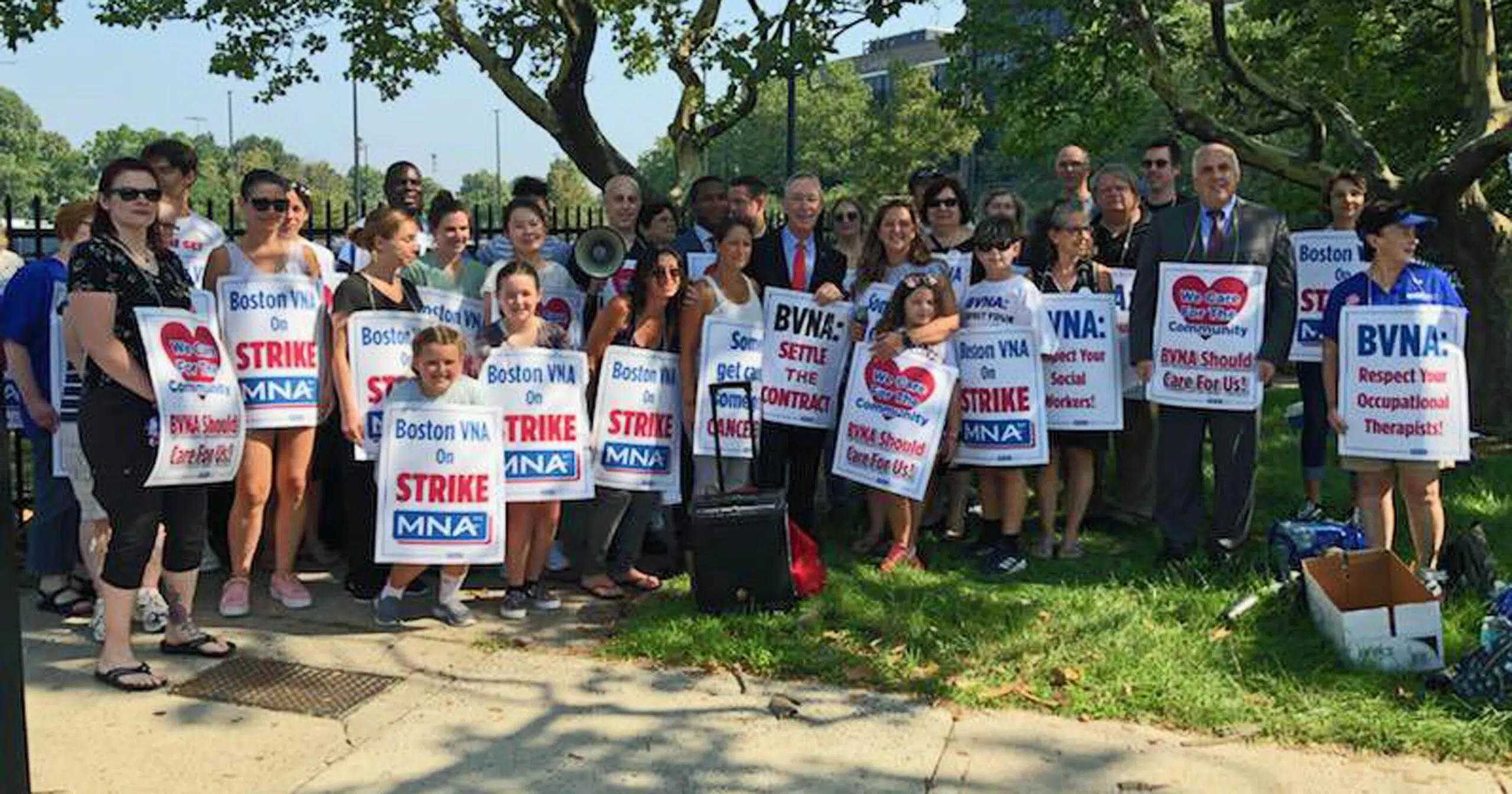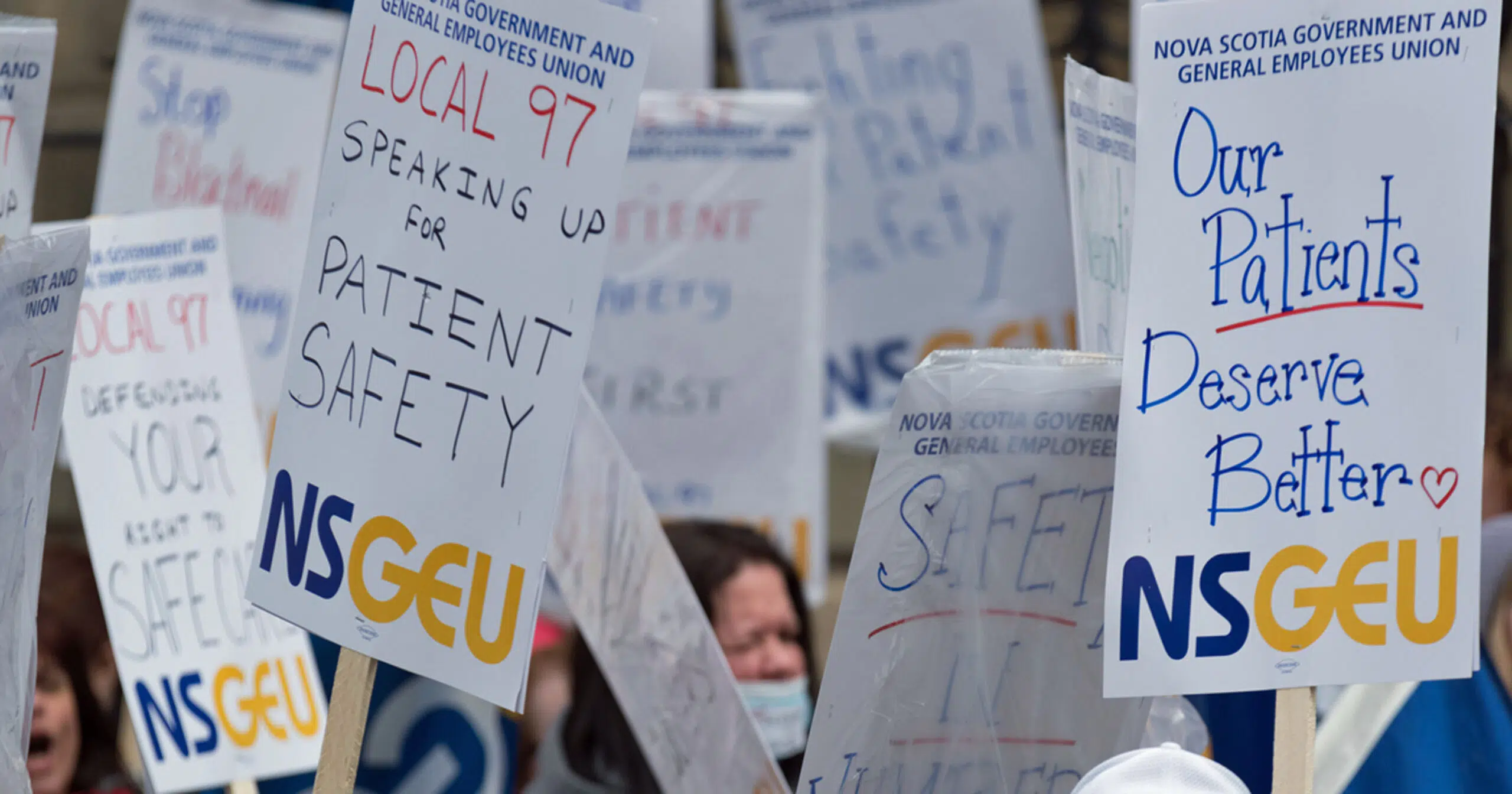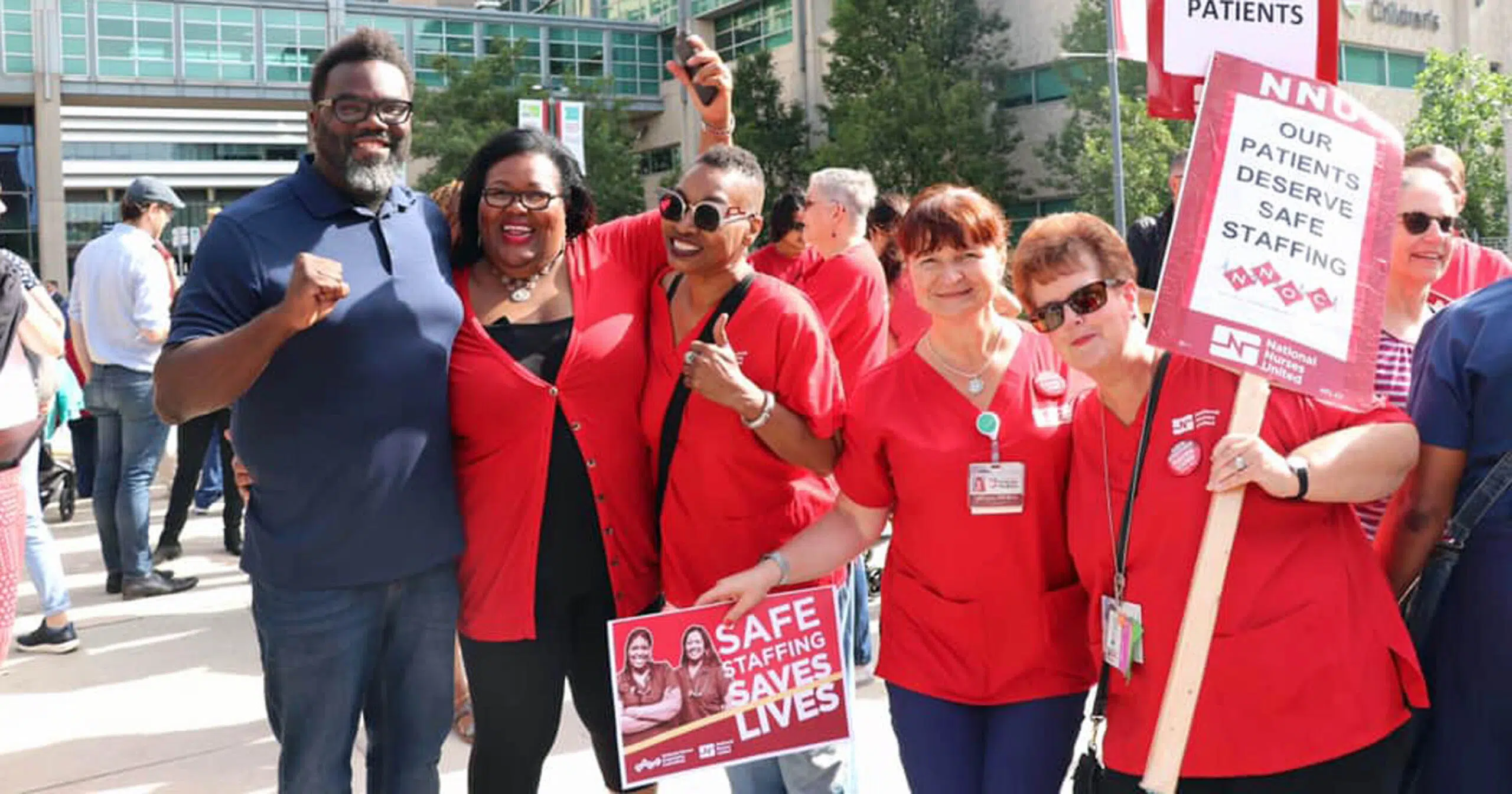Taking a strike contract as a travel nurse has long been a contentious yet lucrative endeavor for registered nurses (RNs), offering both unique opportunities and distinct challenges. These temporary nursing contracts filled during labor disputes typically provide higher than average travel nursing pay, with past wages reported to be over $3,000 weekly per Vivian’s salary data. However, strike contracts also involve complex ethical considerations and unpredictable work environments that you must consider to decide if the pros outweigh the cons.
What Is a Nursing Strike?

A strike can occur when a facility’s nursing staff is part of a nursing union. Unions have agreements with hospitals regarding pay, staffing, ratios, benefits and general working conditions that impact nursing. The union and facility negotiate a contract, and if nurses feel like the hospital isn’t upholding their end of the bargain, they can vote to strike.
Nurses leaving their patients in bed to hit the picket line may sound like abandonment to some, but strikes are usually used as a last resort when the union and the hospital can’t come to an agreement. No healthcare worker wants their patients to feel alone or without care.
With this in mind, strikes are usually announced far enough in advance to give the hospital time to find alternate workers to care for all its patients. Depending on the size of the facility, it can be a challenge for the administration to find short-term temporary workers quickly enough, even with advance notice.
Travel Nursing and Strikes

When hospitals face crises or strikes, and their staff nurses are unavailable, they often turn to travel nurse agencies for help. These agencies reach out to nurses like you, ready to step in at a moment’s notice. The start dates for these contracts are usually within 3-7 days, highlighting the urgency and importance of your role.
Strike contracts usually cover the cost of travel, temporary housing and, if necessary, transportation. However, the facility may secure lodging close to the hospital to avoid having to arrange and pay for transporting the extra staff. Housing is usually prearranged, sometimes at a nearby hotel, as you won’t have time to secure your own accommodations like regular travel nursing jobs.
The pay rates for travel nursing strike contracts are generally high because the facility fully expects you to arrive ready to start. Most contracts require you to work 48-72 hours per week, and there’s usually a prerequisite that the nurse has experience with electronic charting systems.
Given the urgency often associated with strike contracts, moving quickly and strategically evaluating contracts is essential for success. Evaluating any healthcare contract involves several key considerations to ensure it aligns with your goals and values, including:
- Terms and Conditions: Carefully review the contract terms, including pay rate, duration and any clauses related to termination or extensions.
- Facility Reputation: Research the facility’s patient care standards, working conditions and past labor disputes to gauge the potential environment.
- Role Expectations: Clarify your patient load, scope of practice, support from colleagues and supervisors and other role expectations.
- Financial Compensation: Assess the monetary compensation offered, including base pay, overtime rates, bonuses and reimbursement for travel, housing and living expenses.
- Legal and Ethical Aspects: Evaluate any legal and ethical implications associated with the strike, ensuring alignment with your personal and professional values.
- Support Systems: Determine the availability of mentorship, counseling services and resources for coping with high-stress environments.
Reflect on your readiness to handle challenges, like your adaptability, resilience and willingness to confront difficult situations. Being mentally and emotionally prepared can significantly enhance your experience and success in a strike contract.
Benefits of Working Nursing Strikes
Accepting a strike contract as a nurse has a significant financial incentive. These contracts typically offer higher pay rates than regular travel assignments and include the typical benefits of travel nursing, including covered travel expenses, housing and living stipends.
Strike contracts are usually shorter commitments, leading to greater flexibility. A typical travel nurse contract usually has a minimum commitment of 13 weeks, with the option to extend if you and the facility are a good match. Strike contracts may only last 1 to 2 weeks, which is excellent if you like the excitement of new places and being on the go. Another great advantage is if the strike ends early, travel nurses are usually paid for the entire contract, even if they were only there for a day or two.
Challenges of Taking a Strike Contract
Travel nurses are expected to have top-notch nursing skills and be able to hit the ground running. These expectations are even more pronounced for strike contracts. On some contracts, you might not even receive a proper orientation to the unit; if you do, it’s usually brief and basic.
Most strikes occur in unionized facilities, where all nurses within the unit must go on strike if the majority votes in favor. This departure leaves the unit in the hands of outside nurses and travel nurses unfamiliar with the facility, with staffing usually at the bare minimum. Everyone is as new as you, and the unit’s usual operations might be a mystery.
If you’re considering taking a strike contract, be honest with yourself about your experience and how much assistance you usually need in your practice. This honesty goes for any travel nursing contract but is especially true for a strike contract. The more experience you have, the better. Experience brings greater adaptability, allowing you to navigate challenges more effectively.
Another challenge for some travel nurses is crossing a picket line. The striking nurses are fighting for certain rights and processes, and they sometimes perceive that those who cross the picket line don’t support them. This perception is understandable, but it also raises the question of who’s supposed to care for the patients.
Striking nurses understand that nursing is an essential profession. There needs to be nurses in the hospital to care for patients. Without nurses coming in to cover the strike, nurses wouldn’t be allowed to strike due to abandonment and neglect. Most know this and will support you being there and crossing the picket line. However, if the picket line intimidates you, just know that no one can physically touch you as you cross. There tends to be shouting and lots of words, but there’s no threat to your career for crossing a picket line as a travel nurse.
Where Are Travel Nursing Strike Assignments?

Photo Credit: TDKR Chicago 101, CC BY-SA 4.0, via Wikimedia Commons
Nurses across the U.S. are standing up against their facilities and demanding better working conditions. However, organizing a strike without a union is difficult, so most assignments will be at facilities with active union contracts. To accept a travel nursing strike assignment in another state, you must be licensed in the practice state or hold an active multistate license from a state participating in the Enhanced Nurse Licensure Compact.
Recent Nursing Strikes of Note
To help gain a deeper understanding of nursing strikes, let’s discuss a couple of recent strikes, why they happened and their outcomes.
Strike: Kapiolani Medical Center for Women & Children
Length/Dates: January 21 to 28, 2024
Number of Nurses Affected: 600 Registered Nurses
Why: Safe staffing and no mandatory overtime. Advocate for legislation on nurse-to-patient ratios.
Negotiations: After four months of contract negotiations with Hawaii Pacific Health without a resolution, nurses felt they had no choice but to strike to get their voices heard. As of March 29, 2024, there was still no resolution, but meetings between the two parties are ongoing with a federal mediator.
Strike: Robert Wood Johnson University Hospital in New Jersey, represented by United Steelworkers
Length/Dates: August 4 to December, 2023
Number of Nurses Affected: 1,700
Why: Better working conditions for nurses, better pay, safe staffing ratios, hiring additional staff and a cap on insurance costs.
Negotiations: A new contract has been signed and is good until January 2026. This contract addresses safe staffing and compensates nurses when safe staffing levels aren’t met.
Strike: Minnesota Nurses Association over 16 different hospitals
Length/Dates: 3 days in 2022
Number of Nurses Affected: 15,000. Largest nursing strike in U.S. history
Why: Understaffing and safety issues. Concerns regarding hospital executives prioritizing profits over patients.
Negotiations: New contracts at 15/16 hospitals with 17-18% salary increase and granting nurses more influence over staffing decisions.
How to Find a Travel Nursing Strike Contract
Travel nursing strike contracts are very popular and don’t always make it to Vivian. The best advice is to keep an eye on the news for locations where they’re negotiating union contracts. On Vivian, filter your job search for the highest-paying locations and ASAP start date. Jobs under these filters may be strike contracts, while others may be just for an immediate need. Most jobs in the ASAP filter pay over $3,000 per week, plus a living stipend, and have flexible dates.
Having a relationship with a recruiter and all your paperwork in order will make you a prime contender for your desired jobs. If your recruiter knows you’re interested in a strike contract, they can keep you at the top of the list. They can also answer whether an emergency permit or compact licensure will suffice or if you must apply for a full RN state license.
Complete your Vivian Health profile today so you’re ready to go when a strike contract opportunity arises.
Editor’s Note: This blog post originally appeared in July 2020 but was updated in May 2024 to provide more current information.
Feature Image Credit; Dannel Malloy, CC BY 2.0, via Wikimedia Commons










Good morning,
I need some help understanding this: I am currently in a contract at a hospital, and now they are going on strike the day before Thanksgiving and up to Sunday. They have me working four out of the five days that they’re striking. They knew they were striking and purposely put me on that many days. My recruiter is telling me they do not offer any strike pay. My coworkers are telling me I will most likely be the one in charge during the strike. Other travel nurses are telling me that their company is telling them that they are not to work the strike because it’s a liability. My recruiter is not getting back with me on this. Am I required to have to work the strike? I am not there to be a strike nurse, I am there to work my contract. Somebody can help me out with this. I would greatly appreciate it, because I’m not finding anything online about it.
Hello Colleen and thanks for reaching out! We’re sorry you’ve found yourself in a difficult situation. On the one hand, not working your contract could impact your ability to get future travel assignments but working during a strike could present some liability. Ultimately, the decision is yours to make. If your recruiter won’t respond to your question, you might consider talking to her supervisor to help you make your decision.
Is Vivian hosting the next strike in California? If so, how do one apply?
Hello Letisha and thanks for reaching out! Vivian is a jobs marketplace and works with travel agencies and health systems around the nation. If any of the agencies or health systems who partner with us have strike contracts they want posted to our site, then we would have those jobs listed on our regular Browse Jobs platform found here: https://www.vivian.com/browse-jobs/landing. If you’d like to apply for any jobs on Vivian, the first step is to complete your profile (https://www.vivian.com/register/) and update your job preferences to find jobs matching your current requirements. If you have any questions about signing up, the job search process or anything else on our site, please don’t hesitate to go to the “Contact Vivian” option under the Resources tab to speak with our 24/7 help desk. We’d be happy to help!
Thanks so much for your interest, Elaine! Vivian isn’t an agency but a job marketplace that provides the best job search experience for healthcare professionals. To apply for jobs on our site, click the “I’m interested” button on any job posts that interest you to get in touch with the recruiters from the agencies or facilities that posted these jobs. These recruiters can tell you whether they have any strike assignments available. Feel free to use the “Contact Vivian” option under the Resources tab to reach our 24/7 help desk with any questions about the site. Best of luck in your job search!
I am seriously looking to get a strike assignment. I have a Compact RN License. Please contact me if any assignment becomes available in the near future. Thank you.
Thanks so much for your interest, Elaine! Vivian isn’t an agency but a job marketplace that provides the best job search experience for healthcare professionals. To apply for jobs on our site, click the “I’m interested” button on any job posts that interest you to get in touch with the recruiters from the agencies or facilities that posted these jobs. These recruiters can tell you whether they have any strike assignments available. Feel free to use the “Contact Vivian” option under the Resources tab to reach our 24/7 help desk with any questions about the site. Best of luck in your job search!
Interested in strike assignment for MS telemetry
Thanks so much for your interest, Elaine! Vivian isn’t an agency but a job marketplace that provides the best job search experience for healthcare professionals. To apply for jobs on our site, click the “I’m interested” button on any job posts that interest you to get in touch with the recruiters from the agencies or facilities that posted these jobs. These recruiters can tell you whether they have any strike assignments available. Feel free to use the “Contact Vivian” option under the Resources tab to reach our 24/7 help desk with any questions about the site. Best of luck in your job search!